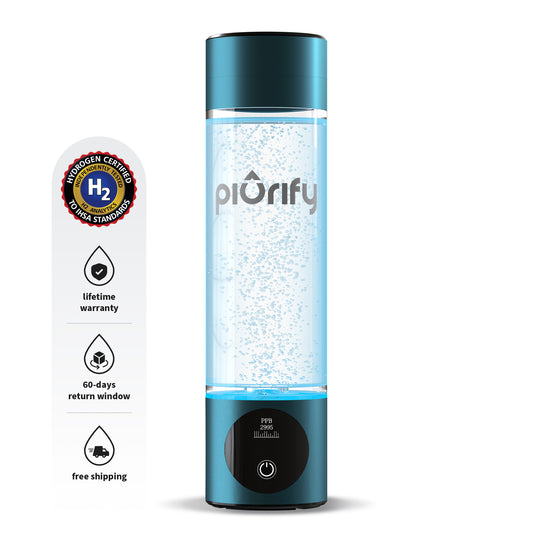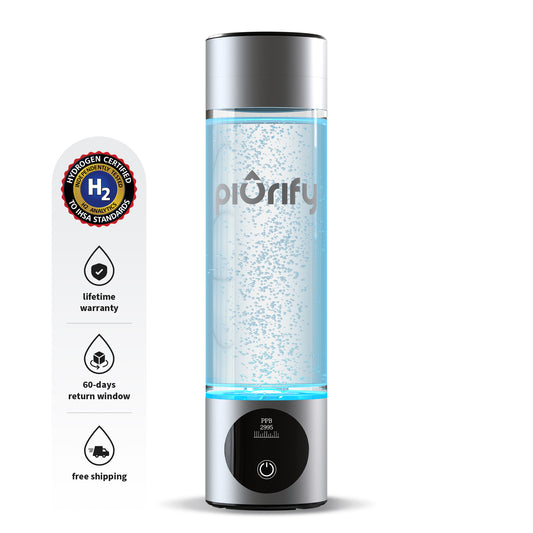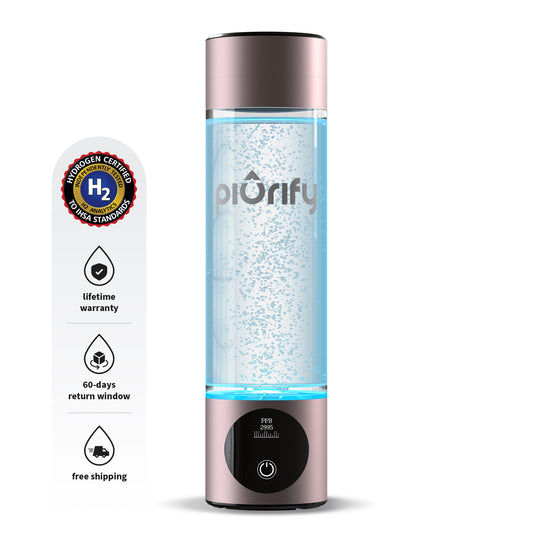How Long Does Hydrogen Water Last?
If you’re considering purchasing a hydrogen water bottle – or you’ve already got one – you probably want to know: How long does hydrogen water last?
Whether you're drinking it straight from a hydrogen water bottle or storing it in a container, knowing how long your water stays hydrogenated is a must. Let’s explore how long hydrogen water lasts, why the hydrogen escapes, and how to store it for optimal hydrogen retention.
What is Hydrogen Water?
Hydrogen water (H₂O) is water that has been infused with molecular hydrogen gas (H₂). The added hydrogen doesn't necessarily change the taste, smell or appearance of the water, but it may offer anti-inflammatory or antioxidant effects, according to some studies.
People drink hydrogen water for a variety of reasons, including:
-
Reducing oxidative stress
-
Enhancing recovery after exercise
-
Supporting general well-being
But how does hydrogen water actually work? Let’s explore the science behind hydrogen water…
The Science Behind Hydrogen Water
Molecular hydrogen (H₂) is the smallest and lightest molecule in the universe - it's highly permeable and escapes from water quickly unless it's stored properly. As a transient molecule, hydrogen does not last long in water unless it has been stored correctly.
Hydrogen water is simply regular water infused with molecular hydrogen gas (H₂), giving it potential antioxidant and anti-inflammatory benefits. Unlike the hydrogen already bound in H₂O, this dissolved molecular hydrogen is free and available for your body to absorb and use.
When consumed, hydrogen-rich water can act as a powerful antioxidant, helping to neutralise harmful free radicals that can lead to inflammation, pain, and premature ageing.
Why Does Hydrogen Escape Water?
Hydrogen molecules are volatile; they don't bind well to water. They rise to the surface and evaporate – or pass through container walls (especially if the water is exposed to air or stored in porous bottles like plastic).
Even if your hydrogen water has been freshly generated and is highly concentrated, the hydrogen will start escaping really quickly, especially if you leave it unsealed or don’t store it correctly. This is why storing it effectively is so important.
How Long Does Hydrogen Stay in Water?
In short, hydrogen begins to dissipate almost immediately after being dissolved in water. However, the exact amount of time hydrogen stays in water depends on how the water is stored:
|
Storage Method |
Hydrogen Retention Time |
|
Open container |
A few minutes |
|
Sealed plastic bottle |
1-2 hours |
|
Sealed aluminium/ Mylar pouch |
3-5 hours |
|
Vacuum-sealed container |
Approx 24 hours |
|
Hydrogen bottle (with storage capability) |
Up to 6+ hours (generate fresh and drink throughout the day) |
Once you open a sealed hydrogen water pouch, it’s best to drink it within 10–15 minutes to get the maximum benefit. Exposure to air causes rapid hydrogen loss, so the clock starts ticking as soon as the seal is broken.
In contrast, many hydrogen water bottles are designed to maintain hydrogen concentration for several hours, even after generation, making them a more effective option for extended use throughout the day.
How Should I Store Hydrogen Water to Maximise Retention?
If you really want to get the most out of your hydrogen water, you need to store it properly. Here are some of the best ways to store it to make sure the hydrogen lasts for as long as possible:
-
Drink it within a few minutes to get the highest concentration of hydrogen
-
Consume it from the original container, such as a hydrogen water bottle. Transferring it to another container can cause the hydrogen to dissipate quickly, just like with fizzy drinks.
-
Keep it cold! Storing your hydrogen water in the fridge helps slow down hydrogen loss.
-
Use an airtight container such as glass, stainless steel or aluminium pouches.

Hydrogen Water Safety Precautions
Hydrogen water is generally considered safe for most people to drink. However, there are still some considerations to keep in mind.
1 – Use Certified, High-Quality Products
Only buy hydrogen water pitchers and bottles from reputable brands that have been tested and certified. Lower-quality products most likely won't infuse your water with a sufficient amount of hydrogen, or could even leach harmful substances into your water. Always check out the reviews before purchasing!
2 – Keep Your Hydrogen Water Bottle Clean
Make sure you keep your hydrogen bottle and pitcher clean to prevent mold and bacteria from building up. We recommend cleaning your water bottle at least once a week. Check whether the product is machine washable, as many hydrogen water products are not.
Check out our blog on how to clean a hydrogen water bottle.
3 – Opt for Food Grade Containers
Always opt for food-grade bottles to avoid potential health risks. Lots of hydrogen water bottles are made from plastic, so always double-check that they are made with safe, food-grade materials.
Pressure-based containers can’t be made using glass, as there is a risk of explosion at high concentrations. They also can not be made using BPA-free TRITAN, as it is a softer material that expands under pressure, which can cause leakage.
Looking to Generate Your Own Hydrogen Water?
You should consume your hydrogen water as soon as possible, which is why our Hydrogenator® Bottle is designed to generate high-concentration hydrogen water on the go – so you can enjoy every sip at its best.
Prefer a solution for home use? Our Hydrogenator® Pitcher is perfect for daily use and helps you stay hydrated and energised throughout the day. Transform your regular water into powerful antioxidant-rich hydration today!
Key Takeaways
-
Hydrogen water contains dissolved molecular hydrogen
-
Hydrogen doesn’t last long in water; it starts escaping within minutes, especially in open or plastic containers.
-
For best results, store in sealed, non-permeable containers and drink quickly after opening or generating.
-
Proper storage can extend hydrogen retention up to 24 hours in optimal conditions, but fresh is best.



